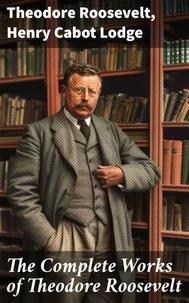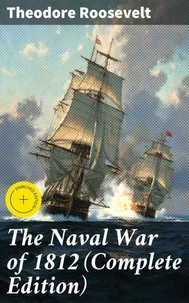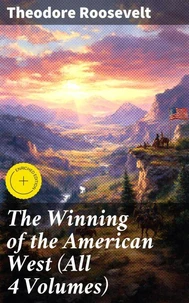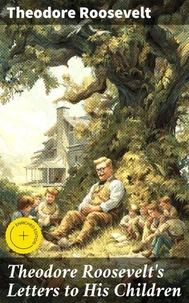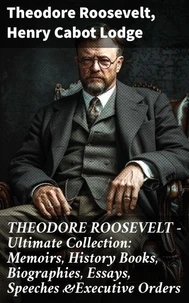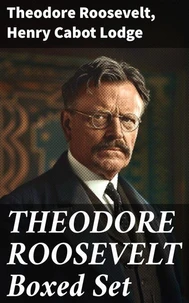Theodore Roosevelt's Letters to His Children
Par : ,Formats :
Disponible dans votre compte client Decitre ou Furet du Nord dès validation de votre commande. Le format ePub est :
- Compatible avec une lecture sur My Vivlio (smartphone, tablette, ordinateur)
- Compatible avec une lecture sur liseuses Vivlio
- Pour les liseuses autres que Vivlio, vous devez utiliser le logiciel Adobe Digital Edition. Non compatible avec la lecture sur les liseuses Kindle, Remarkable et Sony
 , qui est-ce ?
, qui est-ce ?Notre partenaire de plateforme de lecture numérique où vous retrouverez l'ensemble de vos ebooks gratuitement
Pour en savoir plus sur nos ebooks, consultez notre aide en ligne ici
- Nombre de pages222
- FormatePub
- ISBN859-65--4775139-7
- EAN8596547751397
- Date de parution13/12/2023
- Protection num.Digital Watermarking
- Taille898 Ko
- Infos supplémentairesepub
- ÉditeurDIGICAT
Résumé
In "Theodore Roosevelt's Letters to His Children, " the reader is granted an intimate glimpse into the formative thoughts and values of one of America's most dynamic presidents. This compilation of personal correspondence, characterized by its candid tone and playful prose, showcases Roosevelt's ability to blend didactic advice with storytelling. The letters are rich in moral undertones, reflecting the author's belief in the importance of character, resilience, and adventure, imbuing them with a literary style that seamlessly marries familial affection with educational intent.
Set against the backdrop of early 20th-century America, the collection also encapsulates the ideals of masculinity and citizenship prevalent during Roosevelt's era, fostering an understanding of his multifaceted personality as both a father and a national leader. Theodore Roosevelt, a champion of progressive ideals and an advocate for vigorous living, penned these letters during a time of personal and national evolution.
His own upbringing in a prominent New York family instilled in him a deep appreciation for education and a relentless pursuit of knowledge. As an avid naturalist and storyteller, Roosevelt's letters emerge as a pedagogical tool, designed to impart wisdom and foster a love for nature and leadership in his children, reflecting his convictions on the importance of a well-rounded upbringing. I highly recommend "Theodore Roosevelt's Letters to His Children" for readers seeking a profound understanding of both the man and the values he endeavored to impart to future generations.
This work appeals not only to fans of Roosevelt but also to anyone interested in the intersections of politics, family, and literature. It is a treasure trove of insights into the character formation that shaped one of America's most influential figures.
Set against the backdrop of early 20th-century America, the collection also encapsulates the ideals of masculinity and citizenship prevalent during Roosevelt's era, fostering an understanding of his multifaceted personality as both a father and a national leader. Theodore Roosevelt, a champion of progressive ideals and an advocate for vigorous living, penned these letters during a time of personal and national evolution.
His own upbringing in a prominent New York family instilled in him a deep appreciation for education and a relentless pursuit of knowledge. As an avid naturalist and storyteller, Roosevelt's letters emerge as a pedagogical tool, designed to impart wisdom and foster a love for nature and leadership in his children, reflecting his convictions on the importance of a well-rounded upbringing. I highly recommend "Theodore Roosevelt's Letters to His Children" for readers seeking a profound understanding of both the man and the values he endeavored to impart to future generations.
This work appeals not only to fans of Roosevelt but also to anyone interested in the intersections of politics, family, and literature. It is a treasure trove of insights into the character formation that shaped one of America's most influential figures.
In "Theodore Roosevelt's Letters to His Children, " the reader is granted an intimate glimpse into the formative thoughts and values of one of America's most dynamic presidents. This compilation of personal correspondence, characterized by its candid tone and playful prose, showcases Roosevelt's ability to blend didactic advice with storytelling. The letters are rich in moral undertones, reflecting the author's belief in the importance of character, resilience, and adventure, imbuing them with a literary style that seamlessly marries familial affection with educational intent.
Set against the backdrop of early 20th-century America, the collection also encapsulates the ideals of masculinity and citizenship prevalent during Roosevelt's era, fostering an understanding of his multifaceted personality as both a father and a national leader. Theodore Roosevelt, a champion of progressive ideals and an advocate for vigorous living, penned these letters during a time of personal and national evolution.
His own upbringing in a prominent New York family instilled in him a deep appreciation for education and a relentless pursuit of knowledge. As an avid naturalist and storyteller, Roosevelt's letters emerge as a pedagogical tool, designed to impart wisdom and foster a love for nature and leadership in his children, reflecting his convictions on the importance of a well-rounded upbringing. I highly recommend "Theodore Roosevelt's Letters to His Children" for readers seeking a profound understanding of both the man and the values he endeavored to impart to future generations.
This work appeals not only to fans of Roosevelt but also to anyone interested in the intersections of politics, family, and literature. It is a treasure trove of insights into the character formation that shaped one of America's most influential figures.
Set against the backdrop of early 20th-century America, the collection also encapsulates the ideals of masculinity and citizenship prevalent during Roosevelt's era, fostering an understanding of his multifaceted personality as both a father and a national leader. Theodore Roosevelt, a champion of progressive ideals and an advocate for vigorous living, penned these letters during a time of personal and national evolution.
His own upbringing in a prominent New York family instilled in him a deep appreciation for education and a relentless pursuit of knowledge. As an avid naturalist and storyteller, Roosevelt's letters emerge as a pedagogical tool, designed to impart wisdom and foster a love for nature and leadership in his children, reflecting his convictions on the importance of a well-rounded upbringing. I highly recommend "Theodore Roosevelt's Letters to His Children" for readers seeking a profound understanding of both the man and the values he endeavored to impart to future generations.
This work appeals not only to fans of Roosevelt but also to anyone interested in the intersections of politics, family, and literature. It is a treasure trove of insights into the character formation that shaped one of America's most influential figures.


